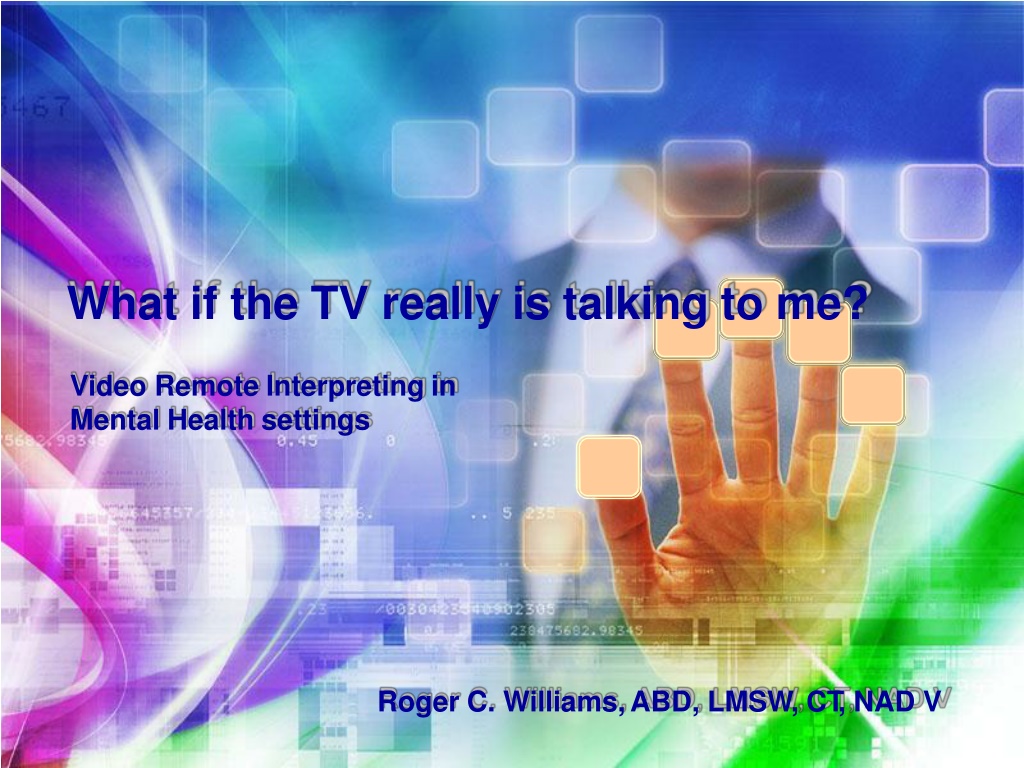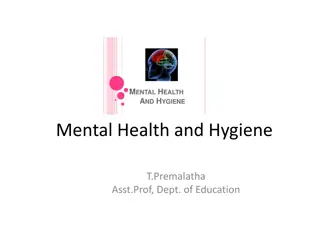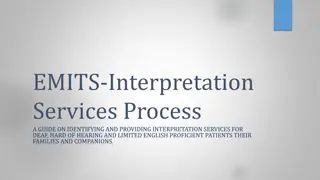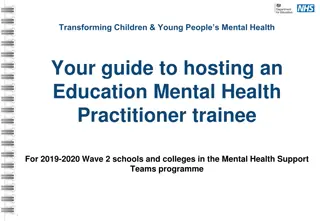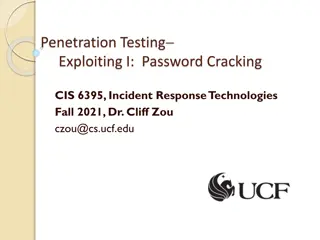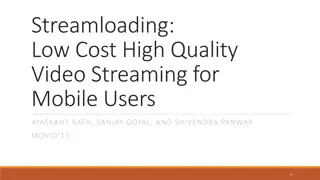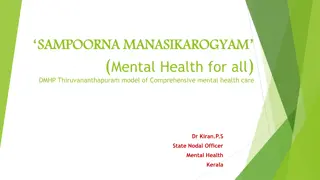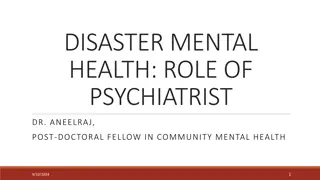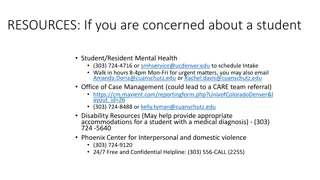Video Remote Interpreting in Mental Health Settings
Explore the challenges and considerations of using Video Remote Interpreting (VRI) in mental health settings through a series of slides discussing decision-making factors, time sensitivity, length of assignments, type of assignments, and the importance of clear communication. The slides emphasize the critical role of form in mental health assessments and highlight the need for appropriate linguistic features and technological comfort in VRI sessions.
Download Presentation

Please find below an Image/Link to download the presentation.
The content on the website is provided AS IS for your information and personal use only. It may not be sold, licensed, or shared on other websites without obtaining consent from the author. Download presentation by click this link. If you encounter any issues during the download, it is possible that the publisher has removed the file from their server.
E N D
Presentation Transcript
What if the TV really is talking to me? Video Remote Interpreting in Mental Health settings Roger C. Williams,ABD, LMSW, CT , NAD V
This is not a question of if? or when?, that has already been answered, with a resounding YES, NOW This is a question of where? and how? Slide #2
How do you decide if appropriate? There is not a definitive answer to this question. It will require weighing several variables These variables include: Time sensitivity Length of assignment Nature of assignment Routine vs. unusual Form critical vs. content critical Client factors Linguistic features Technological comfort Slide #3
Time sensitivity of assignment Urgent vs. scheduled Emergency Room vs. Mental Health Clinic Distant vs. local Not only time but also expense Urgent Scheduled Slide #4
Length of assignment Know your break-even point, which will vary by locale but essentially is the number of minutes when the total cost of VRI equals the minimum hourly fee plus travel required of in-person interpreting. Short/Distant Extended/Local Slide #5
Type of assignment Routine Client and clinician familiar with each other Expectations from both sides clear and well- defined Content emphasis vs. form emphasis 20% Content 80% Form In Mental Health, form is often the critical element, especially in assessment Content Form Slide #6
Form Grammar consistency, age and context appropriate "word salad" "weird Sign Formation slips of the fingers clanging paraphasia Responding to Internal Stimuli Slide #7
Form Discourse circumstantial or tangential perseveration Illogicality Affect Speed of Signing flight of ideas pressured or psychomotor retardation Slide #8
Content Psychosis delusions & hallucinations Orientation To person, place, time Suicidal or Homicidal Ideation Includes ideation, intent, plan and attempt Client history/precipitating factors Slide #9
Client factors Linguistic features Degree of dysfluency ASL fluency Psychotic features Ability/willingness to stay within camera requirements Technological comfort Familiarity with VRI and computers Psychotic process Fluent Dysfluent Slide #10
VRI or In-Person? Urgent Scheduled Short/Distant Extended/Local Content Form Fluent Dysfluent Slide #11
Additional considerations HIPAA Health Insurance Portability and Accountability Act Requires a secure connection and/or informed consent State licensure laws May prohibit interpreting across state lines (case law is still vague and inconsistent) Unknown is where does the interpreting occur Intermediary interpreters Common in mental health, rare in VRI Slide #12
Generally inappropriate for VRI Forensic Assessments Competency exams Insanity determination Psychological testing Violation of testing protocol Abuse investigations Victim interviews Slide #13
Now lets put theory into practice The following case vignettes are typical mental health situations Using the variables from the earlier slides, assess their appropriateness for VRI use No right answers Slide #14
Repeat Psychiatric Checkup 15 minute appointment, 2 hours away Stable medication Assessment of side effects and medication response Urgent Scheduled Short/Distant Extended/Local Content Form Dysfluent Fluent Slide #15
Intake Appointment Scheduled at mental health center (MHC) an hour away, two hour appointment Client is new to mental health center Assessment includes paperwork and interviews Urgent Scheduled Short/Distant Extended/Local Content Form Dysfluent Fluent Slide #16
Emergency Room Visit Client brought in by police, disoriented and agitated It is 10:00 pm Friday night, 2 hours before a live interpreter can arrive Goal of assessment is retain or discharge, not treatment Urgent Scheduled Short/Distant Extended/Local Content Form Dysfluent Fluent Slide #17
The next slide will show the questions which will be discussed at the discussion forum. THANK YOU!
Discussion Questions What information would a VRI interpreter need before making a decision to accept or reject a mental health assignment? Teamwork is an essential characteristic of mental health interpreting. How can the VRI interpreter and the in-person interpreter work together to improve client care? Suppose you are interpreting for an emergency room visit and the client starts displaying significant dysfluency (paralinguistic demand). What controls might be available to the VRI interpreter? Slide #19
